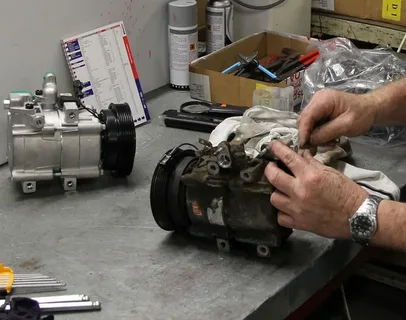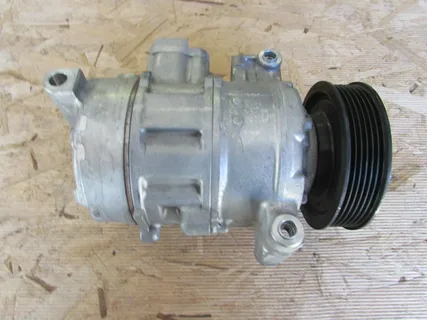If you own a VZ Air Conditioning Compressor, you know how essential it is to keep it in top condition to ensure your home stays cool during the hot summer months. Regular maintenance is crucial in preventing costly repairs and extending the lifespan of your compressor. In this blog post, we will discuss some maintenance tips to help you keep your Conditioning Compressor running smoothly. These measures can significantly enhance your compressor’s performance, from cleaning and inspection, to timely repairs and replacement of worn-out parts. Let’s delve into the specifics.
Understanding Your VZ Air Conditioning Pump
To effectively maintain and troubleshoot your Conditioning Compressor, it’s crucial to have a foundational understanding of the Air Conditioning Pump component. The pump, often called the heart of the air conditioning system, plays a pivotal role in cooling your home. It functions by circulating the refrigerant necessary for heat exchange through the coils of the air conditioning system, facilitating the removal of heat from indoor air and its release outdoors.
The efficiency and longevity of your Air Conditioning Compressor heavily rely on the proper operation of the air conditioning pump. This component is designed to withstand rigorous use during the hotter months, but like any mechanical part, it requires periodic attention to ensure it operates efficiently. Understanding the mechanics behind the pump can aid in identifying when maintenance is needed and can help prevent overlooking signs that may indicate potential issues.
Maintenance of the VZ Air Conditioning Pump involves checking for leaks in the refrigerant lines, ensuring the pump’s belts (if applicable) are well-tensioned and in good condition, and listening for any irregular sounds that might suggest internal problems. Although some aspects of its maintenance might require professional intervention, gaining insight into how your air conditioning pump operates can empower you to take proactive steps in its upkeep. This ensures the smooth functioning of your Conditioning Compressor and contributes to the overall efficiency and effectiveness of your cooling system. By understanding your Conditioning Pump, you’re better equipped to maintain an optimal home environment, making those hot summer days more bearable.
Signs Your VZ Compressor Needs Attention
Keeping a vigilant eye on the performance and behaviour of your Conditioning Compressor can save you from unexpected breakdowns and costly repairs. Specific indicators shouldn’t be ignored; they suggest that your compressor might need some TLC. One of the most common signals of trouble is unusual noises from the unit. These sounds, ranging from rattling to hissing, often point to internal issues that need immediate attention.
Another telltale sign is a noticeable decline in cooling efficiency. If your home isn’t getting as cool as it used to, or if it’s taking significantly longer to reach a comfortable temperature, the compressor may struggle. This inefficiency can lead to an uncomfortable environment and should be checked immediately.
Leakages around the compressor unit are also a red flag. Refrigerant leaks impair cooling efficiency, can cause environmental damage and pose health risks. Moreover, an unexplained spike in your energy bills can indicate that the compressor is working overtime to maintain cool temperatures, hinting at underlying problems causing it to operate inefficiently.
Paying attention to these signs and acting promptly can prevent minor issues from escalating into major problems. Ignoring these warning signals can strain your air conditioning system, leading to further damage and, ultimately, the need for extensive repairs or a complete compressor replacement.
 Proper Maintenance to Prevent Air Conditioning Compressor Issues
Proper Maintenance to Prevent Air Conditioning Compressor Issues
Proper maintenance is crucial for ensuring the longevity and efficiency of your air conditioning compressor. Following a few essential practices can prevent potential issues and avoid costly repairs.
Regular Cleaning and Inspections
One of the most critical aspects of compressor maintenance is regular cleaning and inspections. Over time, dirt, debris, and dust can accumulate on the compressor coils and fins, reducing airflow and efficiency. Regularly clean these components and inspect for any signs of damage or wear. This simple task can significantly extend the life of your compressor.
Checking Refrigerant Levels
The refrigerant in your air conditioning system is vital for its proper functioning. Low refrigerant levels can lead to decreased cooling performance and even compressor damage. Schedule regular inspections with a qualified technician to ensure that refrigerant levels are optimal and that there are no leaks in the system.
Lubrication of Moving Parts
The compressor has various moving parts that require adequate lubrication to operate smoothly. Over time, lubricants can degrade, leading to increased friction and potential component failure. Regularly check and lubricate these parts according to manufacturer guidelines to maintain optimal performance.
Monitoring Thermostat Settings
Incorrect thermostat settings can cause the compressor to work harder than necessary, leading to premature wear and higher energy bills. Ensure that your thermostat is calibrated correctly and set at an efficient temperature. Consider investing in a programmable thermostat to regulate temperatures automatically when you are away from home.
The Cost of Ignoring Compressor Problems
Overlooking issues with your Conditioning Compressor doesn’t just risk a minor inconvenience; it paves the way for a cascade of adverse outcomes that could severely impact your comfort and wallet. When the compressor is not operating efficiently, it’s not merely about the system working a bit harder. The strain placed on your air conditioning system can accelerate wear and tear, pushing your system towards a premature breakdown. This disrupts the comfort of your living space and translates into higher operational costs. The inefficiency leads to the system consuming more energy to achieve the desired cooling effect, significantly increasing your monthly energy bills.
Moreover, minor unattended issues can morph into severe problems, necessitating extensive repairs. In some instances, the damage might be so vast that repair is no longer viable, forcing you to shoulder the substantial cost of replacing the compressor or the entire air conditioning system. Beyond the financial implications, there’s also the inconvenience and discomfort of living without a functional air conditioning system until repairs or replacements are made.
Additionally, a malfunctioning compressor can negatively affect the overall air quality in your home. A system struggling to maintain optimal performance may fail to adequately remove humidity and circulate clean air, creating a less comfortable and potentially unhealthy indoor environment.
Ignoring the signs that your Conditioning Compressor needs attention doesn’t just postpone the inevitable. It sets the stage for more significant issues that can be more costly and challenging to resolve, underlining the importance of addressing any compressor problems promptly.
Troubleshooting Common Holden Air Conditioning Compressors Problems
Holden vehicles, like any others, can experience issues with their conditioning compressors. Here are some common problems you might encounter and steps to troubleshoot them:
1. No Cold Air
If your Holden’s air conditioning system blows warm air instead of cold, the compressor might not engage correctly. Check the compressor clutch to see if it’s engaging when the AC is turned on. If not, it could be due to a faulty clutch, low refrigerant levels, or an electrical issue. Ensure the compressor clutch wiring is intact and check refrigerant levels to rule out leaks.
2. Loud Noises
Unusual noises from the compressor, such as grinding or squealing, could indicate a mechanical problem. Worn-out bearings, a loose belt, or internal component failure may cause this. Inspect the compressor visually for any signs of damage or leaks. Replace any worn-out belts and have the compressor checked by a professional if noises persist.
3. Intermittent Cooling
If the AC cools inconsistently, cycling between cold and warm air could be due to an issue with the compressor cycling switch, which regulates Holden Air Conditioning Compressors‘ operation. A malfunctioning switch may cause the compressor to turn on and off erratically. Have the switch tested and replaced if necessary to restore consistent cooling.
4. Leaking Refrigerant
A common issue in older systems is refrigerant leaks. Insufficient refrigerant levels can prevent the compressor from operating effectively, leading to poor cooling performance. Inspect the AC system for visible leaks or oily residue, indicating refrigerant leakage. Address leaks promptly and recharge the system with the correct refrigerant type.
Maximizing Your VZ Compressor’s Lifespan
When extending your VZ compressor’s lifespan, proactive maintenance and proper operational practices are critical. Here’s a guide to help you get the most out of your equipment:
Regular Maintenance Checks
Scheduled maintenance is crucial for the longevity of your VZ compressor. Establish a routine inspection schedule to check for leaks, worn-out parts, and proper lubrication. Ensure that filters are cleaned or replaced as recommended by the manufacturer. Addressing minor issues promptly can prevent them from escalating into major problems that could shorten the compressor’s lifespan.
Optimal Operating Conditions
Maintain ideal operating conditions to reduce wear and tear on your VZ compressor. This includes monitoring ambient temperature and humidity levels, as extreme conditions can strain the equipment. Ensure adequate ventilation to prevent overheating, and consider installing vibration isolation pads to minimize mechanical stress.
Correct Lubrication Practices
Proper lubrication is essential for the smooth operation of your compressor. Use the recommended lubricants in the correct amounts and intervals specified by the manufacturer. Over-lubrication can be as detrimental as under-lubrication, so follow guidelines diligently.
Training and Awareness
Ensure that operators and maintenance personnel are adequately trained in the operation and maintenance of the VZ compressor. Educate them on best practices, safety protocols, and the importance of adhering to manufacturer guidelines. Proper handling by trained personnel can prevent accidental damage and premature wear.
Conclusion
Maintaining the optimal functionality of your VZ Air Conditioning Compressor is integral for achieving a calm and serene environment within your home, especially during the scorching summer months. Embracing the maintenance tips provided in this guide not only aids in averting potential issues but also significantly contributes to the longevity and efficiency of your compressor. The emphasis on proactive measures – from regular checks and cleanings to professional inspections – cannot be overstated. These steps are not mere suggestions but essential practices that are the foundation for a reliable and effective air conditioning system.
FAQS
Q: How frequently is it recommended that my conditioning compressor be serviced?
A: An annual professional inspection is generally recommended to ensure that your compressor and the entire air conditioning system remain in optimal condition. Regular checks can identify and address potential issues before they become major problems, saving you time and money in the long run.
Q: What initial steps should I take if my VZ Air Conditioning Compressor stops working?
A: Before contacting a professional, perform a few basic troubleshooting steps. Check if the unit receives power by examining the circuit breaker or fuse box for any issues. Verify that the thermostat is correctly set for cooling and ensure no obstructions around the VZ Air Conditioning Compressor unit could impede airflow. If these steps don’t resolve the issue, it’s time to consult with a professional technician.
Q: Can I perform any compressor maintenance tasks myself?
A: Several maintenance tasks can be safely and effectively performed without professional help. Regularly cleaning or replacing the air filter, ensuring the area around the outdoor unit is free of debris, and visually inspecting the unit for any obvious signs of wear or damage are all steps you can take. However, it’s best to contact a professional for more complex issues or if you’re unsure about a problem.
| Other Good Articles to Read |
| Cme Blog Spot |
| Garcias Blogs |
| Yyc Blogs |
| Guiade Blogs |
| Blogs-Hunt |
| Impact-Blog |
| Smarty Blogs |
| Ed Blog |
| Mo Blogs |
| Blogs Em |
| Blog St |
| Related Business Listings |
| Contact Directory |
| Local Business Profiles |



